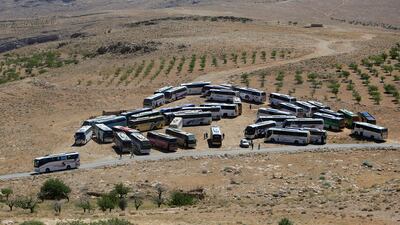After a week-long campaign in the mountainous no-man’s land near the village of Arsal in northern Lebanon, Hizbollah and the group formerly known as Jabhat Al Nusra signed a truce that ensured militants, fighters, their families and several thousand refugees could cross the Syrian border and go to Idlib.
Since 2011, several incidents at the border have been a tell-tale sign that the conflict could cross into the plains of the Beqaa Valley. This is mainly linked to Hizbollah’s active participation in the war, though several terrorist attacks have touched various Lebanese regions in the past few years.
The country’s government, held hostage by the powerful Iran-backed militia, was operating under a presidential vacuum that lasted two and a half years, in a state which the economy and security may reach breaking point at any moment. Several months into his presidential mandate, Michel Aoun has been unable to bring about the many reforms he had promised and has described Hizbollah as "an essential part" of the country's defence architecture. The country is strained by more than one million registered Syrian refugees and a sovereign public debt expected to grow to more than 160 per cent of GDP by 2021, according to the IMF.
Some say that Lebanon has served as a land of asylum for refugees ever since wars started troubling the region. The conflict between Palestine and Israel at the end of the 1940s and the beginning of the 1950s led to the establishment of several refugee camps in Lebanon, many of which are home to refugees living in precarious circumstances, under the yoke of armed factions that violate stability and often enter into confrontations with the Lebanese Army.
In the meantime, the unwanted Syrian refugees that are willingly heading back to their home country will live in the fear of the unknown, where home may no longer be home.

